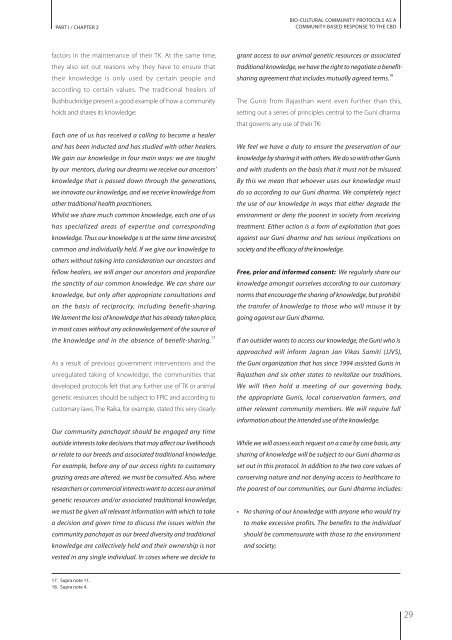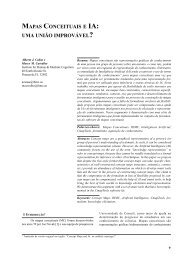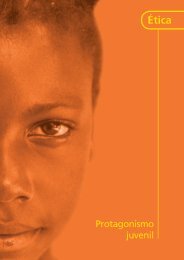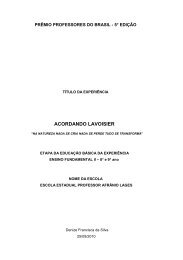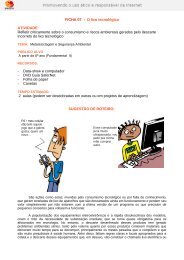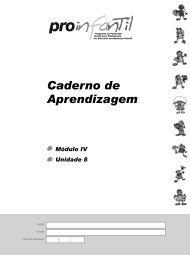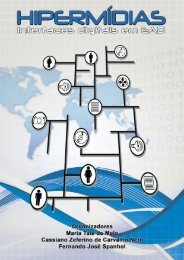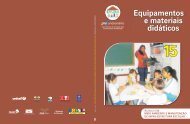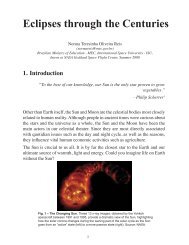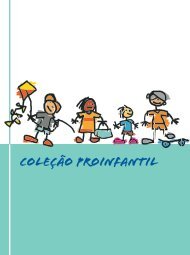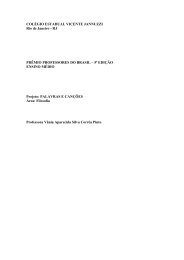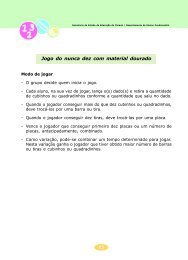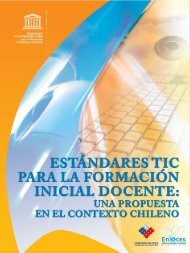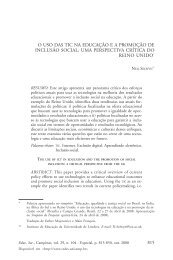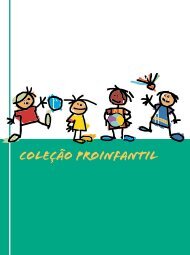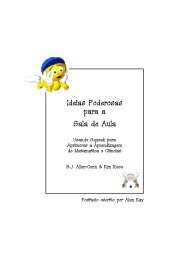BIO-CULTURAL COMMUNITY PROTOCOLS - Portal do Professor
BIO-CULTURAL COMMUNITY PROTOCOLS - Portal do Professor
BIO-CULTURAL COMMUNITY PROTOCOLS - Portal do Professor
Create successful ePaper yourself
Turn your PDF publications into a flip-book with our unique Google optimized e-Paper software.
PART I / CHAPTER 2<br />
factors in the maintenance of their TK. At the same time,<br />
they also set out reasons why they have to ensure that<br />
their knowledge is only used by certain people and<br />
according to certain values. The traditional healers of<br />
Bushbuckridge present a good example of how a community<br />
holds and shares its knowledge:<br />
Each one of us has received a calling to become a healer<br />
and has been inducted and has studied with other healers.<br />
We gain our knowledge in four main ways: we are taught<br />
by our mentors, during our dreams we receive our ancestors’<br />
knowledge that is passed <strong>do</strong>wn through the generations,<br />
we innovate our knowledge, and we receive knowledge from<br />
other traditional health practitioners.<br />
Whilst we share much common knowledge, each one of us<br />
has specialized areas of expertise and corresponding<br />
knowledge. Thus our knowledge is at the same time ancestral,<br />
common and individually held. If we give our knowledge to<br />
others without taking into consideration our ancestors and<br />
fellow healers, we will anger our ancestors and jeopardize<br />
the sanctity of our common knowledge. We can share our<br />
knowledge, but only after appropriate consultations and<br />
on the basis of reciprocity, including benefit-sharing.<br />
We lament the loss of knowledge that has already taken place,<br />
in most cases without any acknowledgement of the source of<br />
the knowledge and in the absence of benefit-sharing. 17<br />
As a result of previous government interventions and the<br />
unregulated taking of knowledge, the communities that<br />
developed protocols felt that any further use of TK or animal<br />
genetic resources should be subject to FPIC and according to<br />
customary laws. The Raika, for example, stated this very clearly:<br />
Our community panchayat should be engaged any time<br />
outside interests take decisions that may affect our livelihoods<br />
or relate to our breeds and associated traditional knowledge.<br />
For example, before any of our access rights to customary<br />
grazing areas are altered, we must be consulted. Also, where<br />
researchers or commercial interests want to access our animal<br />
genetic resources and/or associated traditional knowledge,<br />
we must be given all relevant information with which to take<br />
a decision and given time to discuss the issues within the<br />
community panchayat as our breed diversity and traditional<br />
knowledge are collectively held and their ownership is not<br />
vested in any single individual. In cases where we decide to<br />
17. Supra note 11.<br />
18. Supra note 4.<br />
<strong>BIO</strong>-<strong>CULTURAL</strong> <strong>COMMUNITY</strong> <strong>PROTOCOLS</strong> AS A<br />
<strong>COMMUNITY</strong>-BASED RESPONSE TO THE CBD<br />
grant access to our animal genetic resources or associated<br />
traditional knowledge, we have the right to negotiate a benefitsharing<br />
agreement that includes mutually agreed terms. 18<br />
The Gunis from Rajasthan went even further than this,<br />
setting out a series of principles central to the Guni dharma<br />
that governs any use of their TK:<br />
We feel we have a duty to ensure the preservation of our<br />
knowledge by sharing it with others. We <strong>do</strong> so with other Gunis<br />
and with students on the basis that it must not be misused.<br />
By this we mean that whoever uses our knowledge must<br />
<strong>do</strong> so according to our Guni dharma. We completely reject<br />
the use of our knowledge in ways that either degrade the<br />
environment or deny the poorest in society from receiving<br />
treatment. Either action is a form of exploitation that goes<br />
against our Guni dharma and has serious implications on<br />
society and the efficacy of the knowledge.<br />
Free, prior and informed consent: We regularly share our<br />
knowledge amongst ourselves according to our customary<br />
norms that encourage the sharing of knowledge, but prohibit<br />
the transfer of knowledge to those who will misuse it by<br />
going against our Guni dharma.<br />
If an outsider wants to access our knowledge, the Guni who is<br />
approached will inform Jagran Jan Vikas Samiti (JJVS),<br />
the Guni organization that has since 1994 assisted Gunis in<br />
Rajasthan and six other states to revitalize our traditions.<br />
We will then hold a meeting of our governing body,<br />
the appropriate Gunis, local conservation farmers, and<br />
other relevant community members. We will require full<br />
information about the intended use of the knowledge.<br />
While we will assess each request on a case by case basis, any<br />
sharing of knowledge will be subject to our Guni dharma as<br />
set out in this protocol. In addition to the two core values of<br />
conserving nature and not denying access to healthcare to<br />
the poorest of our communities, our Guni dharma includes:<br />
• No sharing of our knowledge with anyone who would try<br />
to make excessive profits. The benefits to the individual<br />
should be commensurate with those to the environment<br />
and society;<br />
29


